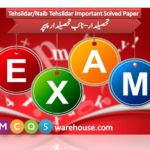PPSC Educators jobs
PPSC Educators Jobs 2021
PPSC Educators Paper Pattern
The pattern of PPSC educators jobs Test will be consisting of both group Science & Arts
*ESE-Arts(BPS-14)*
*Subjects Marks*
1. English( primary level)= 30
2. Urdu ( primary level )= 15
3. Islamiyat & Pak Study ( P.L )= 10
4. Math ( Primary Level )= 20
5. Science ( Primary Level )= 10
6. B.ed ( learning, planning… Class Room Strategies )= 10
7. Current Affairs/General Knowledge= 05
*ESE-Science* *Math(BPS-14)*
*Subjects Marks*
1. English( primary level)= 15
2. Urdu ( primary level )= 10
3. Islamiyat & Pak Study ( P.L ) =10
4. Math ( Primary Level )= 25
5. Science ( primary Level )= 25
6. B.ed ( learning, planning… etc ) =10
7. Current Affairs/General Knowledge= 05
i. you read every newspaper because current affairs also include in this test
ii. you also touch with the General knowledge about everything
iii. you have also Islamic knowledge
iv. you also learn basic computer knowledge
v. Buying a specific NTs-book and read it daily properly
SESE & SSE BPS (15-16):
Subject Marks: 80
B.ed + GK= 20
Headmaster Subject Specialist (BPS 17):
Subject: 80
Pedagogy: 20
Full PPSC Educators Solved Past Paper
Select the best option/answer and fill in the appropriate box on the Answer Sheet.
1. ___________was of the view that education consists of the intellectual and moral training of the mankind through which their hidden potentialities are developed.
a. Imam Ghazali
b. Rousseau
c. Aristotle
d. Ibn Khaldun✔️
2. In__________ Aristotle was restored to his most honoured place and his work is being studied throughout the world.
a. 19th Century
b. 20th Century✔️
c. 19th Century
d. 18th Century
3. According to ‘Socratic Method’, the aim of education was not merely the
accumulation of knowledge through lectures, but the development of ______________:
a. Power of classification
b. Power of practice
c. Power of conversation
d. Power of thinking✔️
4. Imam Ghazali’s earlier approach towards education and life was__________ and logical in nature.
a. Psychological
b. Philosophical✔️
c. Biological
d. Based on reason
5. ______________described Aristotle as ‘the master of those who know”.
a. Rousseau
b. Sir Philip Sydney
c. Dante✔️
d. Dr. Jhonson
6. The subjects like Fiqah, Tafseer, Hadith and Industrial Arts come under
the category of
a. Farz-i-Yaqeen
b. Farz-i-Islam
c. Farz-i-Ain
d. Farz-i-Kafaya✔️
7. The Islamic school with all its different degrees was a house for education in addition to
a. Knowledge
b. Training
c. Intuition
d. Worship✔️
8. The school at that time was not isolated from the rest of the society, in fact it fixed the values by which society lived and completed and developed those values on the basis of
a. Islam
b. Knowledge
c. Science✔️
d. Experiences
9. The other sciences taught in those schools were not divorced from religious sciences in the curricula or from the religious spirit pervading all education and
a. Research
b. Society✔️
c. Training
d. Institute
10. The students were required to know religious matters on the one hand and to know the_________________ on the other hand.
a. Traditions
b. Culture
C. Rules
d. Sharia✔️
11. A knowledge of_________________ is not an end itself but its purpose was
to bring to successive generations on the basis of sound religion
a. Sharia
b. World
c. Life Hereafter
d. Religions✔️
12. The Muslim is committed to utilize the fruit of________________ according to the work of God.
a. Science✔️
b. Knowledge
c. Religion
d. Teachings
13. drawing the attention of the people towards the signs of God in the universe and consequently urging people to worship God without___________.
a. Doubt
b. Partner✔️
c. Misconception
d. Hesitation
14. Other _______________ must be taught as tools we use to realize the divine plan in everything on earth for the benefit of man.
a. Religions
b. Knowledge
c. Things
d. Sciences✔️
15. The Muslim student has to be constantly reminded of the message entrusted to him by God and ______________ is the means to realize it.
a. Science✔️
b. Religion
c. Knowledge
d. Wisdom
16. The revelation of mysteries of existence and vitality is called philosophy___________ is a statement by
a. Russell
b. John Dewey
c. Alkindi
d. Maulana Abul Kalam Azad✔️
17. This world is not a mere reflection but has its own actual existence and the matter is the only common reality and the universe is considered both mortal and immortal ________________ is a philosophy called
a. Idealism
b. Realism✔️
c. Naturalism
d. Pragmatism
18. The philosophy belonging to Aristotle, the student of Plato is
a. Realism✔️
b. Idealism
c. Naturalism
d. Pragmatism
19. The founder of pragmatism was
a. Aristotle
b. John Dewey✔️
c. Socrates
d. Ibn Khaldun
20. The philosophy that is against change and considers permanence more real is
a. Essentialism
b. Perennialism✔️
c. Reconstructionism
d. Progressivism
21. This universe was not created itself but is the requirement of plan and determination of an entity, God—the ultimate reality—is the basis of philosophy called
a. Idealism
b. Pragmatism
c. Naturalism
d. Islamic Philosophy✔️
22. According to ___________________ God is the ultimate reality and man to Him is a servant or a devotee.
a. Ibn Khaldun
b. Imam Ghazali✔️
C. Abula’ala Maudoodi
d. Shah Waliullah
23. The great philosopher who translated the Holy Quran into Persian for the first time was
a. Allama Iqbal
b. Shah Waliullah✔️
c. Ibn Khaldun
d. Abula’la Maudoodi
24. The ultimate reality is God who created this universe for a purpose. The love for Holy Prophet (PBUH) is a very strong stimulator for reorganization of Islam—is a philosophy presented by a Muslim philosopher
a. Shah Waliullah
b. Sir Syed Ahmad Khan
c. Allama Iqbal✔️
d. Ibn Khaldun
25. In Islamic teaching methodology, the central role is played by
a. Teacher✔️
b. Society
c. Student
d. Culture
26. The creation of man reveals that there is always a ______________ behind his every action; more his philosophy is obvious about something, mor that work flourishes.
a. Technicality
b. Philosophy✔️
c. Logic
d. Reason
27. According to Islam, education develops in man the qualities of
a. Firm believer in unity of God
b. A thankful person of God
C. To spend life according to Islamic laws
d. All of the above✔️
28. Whose definition of education do educational experts conside comprehensive?
a. Rousseau’s
b. Ibn Khaldun’s
c. John Dewey’s✔️
d. Syed Abula’la Maudoodi’s
29. Why the definition of education, presented by John Dewey is considered comprehensive?
a. As it gives the lesson of simplicity
b. As it contains the idea of movement✔️
c. As it is the commonest definition
d. None of the above
30. What are the benefits of the education attained through experiences?
a. Education becomes the part of a person’s personality and makes him habitual of meditation.
b. Develops scientific thoughts
c. Initiates the passion for cooperation and unity.
d. All of the above✔️
31. The first object of education in Islam is
a. Worshipping✔️
b. Circulation of Education
C. Self-piety
d. Sincerity
32. Education holds a great importance for
a person because
a. Education highlights the hidden abilities.
b. Education becomes the source of awareness of God
c. Education is necessary for the solidity of a society
d. All of the above✔️
33. What were the main bases of Syed Ahmad’s appeal to Muslims of his time?
a. Religious✔️
b. Ethnic
c. Conventional
d. Developmental
34. The Movement of Aligarh was the element of
a. Reconciliation& rapprochement✔️
b. Education & Religion
c. Politics & Religion
d. Compromise & Religion
35. After the failure in war of 1857, the Muslims realized that English were
adamant to ____________________ their educational system.
a. Promote
b. Nullify
c. Abolish✔️
d. Establish
36. What were the main bases of Syed Ahmad’s appeal to Muslims of his time?
a. Religious✔️
b. Ethnic
c. Conventional
d. Developmental
37. The policy of English men for the Muslims was malicious and______________
a. Forgiving
b. Lenient
c. Vindictive✔️
d. Gracious
38. The attempt to regenerate the Muslim community was known as_________________
Movement
a. Religious
b. Aligarh✔️
c. Secular
d. Holy
39. When the culture and traditions of Muslims were neglected, Muslims
boycotted the modern educational system; not for English language but for the Western educational system that was entirely based on_________________.
a. Modernism
b. Secularism
c. Christianity✔️
d. Conventionalism
40. When Sir Syed was transferred to Benares?
a. 1876
b. 1879
c. 1877
d. 1867✔️
41. The choice of Aligarh as the birthplace of a new movement was due to some reasons such as:
a. Aligarh was “in a dear name”✔️
b. Muslims gave donations in support of this place.
c. Mohammedans population and Mohammedans feudal aristocracy surrounded it.
d. Both a &c
42. On which lines he founded education better and encouraging for Muslim youth?
a. Religious
b. Conventional
c. Western✔️
d. Eastern
43. According to a European educational historian, N. N. Law, in___________________
such steps were taken through the resources of East India company that had the main purpose to prepare subcontinent for the education of Bible.
a. 1602
b. 1604
c. 1600
d. 1614✔️
44. Which was the educational language of Hindus?
a. Hindi
b. Sanskrit✔️
c. Urdu
d. Persian
45. When did the trade affairs start between South Asia and Arabs?
a. Before the prevalence of Islam✔️
b. Before the arrival of Muslims
c. After the death of Harsh
d. None of these
46. Where did Arabs have established their trade centres?
a. Western coast of South Asia✔️
b. Western coast of North Asia
c. Eastern coast of South Asia
d. Northern coast of South Asia
47. Who made it possible to get the goods of Hindu estates reach European
markets?
a. The Arabs✔️
b. Muslims
c. Hindus
d. British
48. The noble and brave traders of Arab used to come to the areas of_____________
.
a. Asia
b. Britain
c. Northern Coasts of Asia
d. Lanka and Malabar✔️
49. When did the people of llafi tribe murder the governor of Makran an made their habitat in the area of Raja Dahir?
a. 702✔️
b. 705
c. 801
d. 701
50. The raja of Sarandeep Sirilanka sent some orphan girls to Hajaj but-
attacked and captured them.
a. Hajaj’s Army
b. Dahir’s Army✔️
c. British Army
d. Abbasid’s Army
♦ For More Complete Solved Paper Visit Educators Papers ♦





